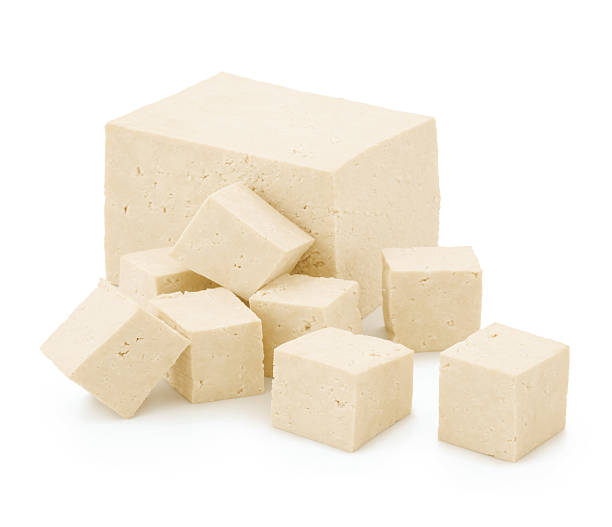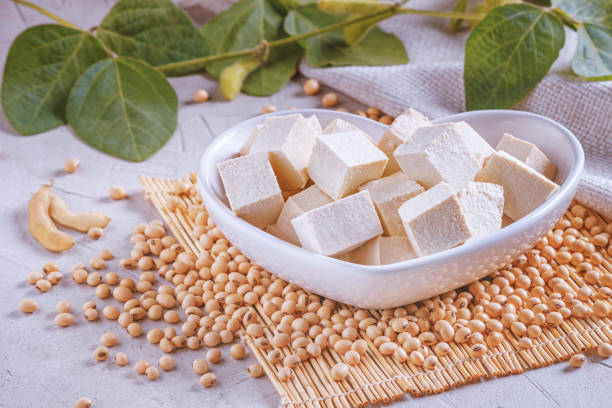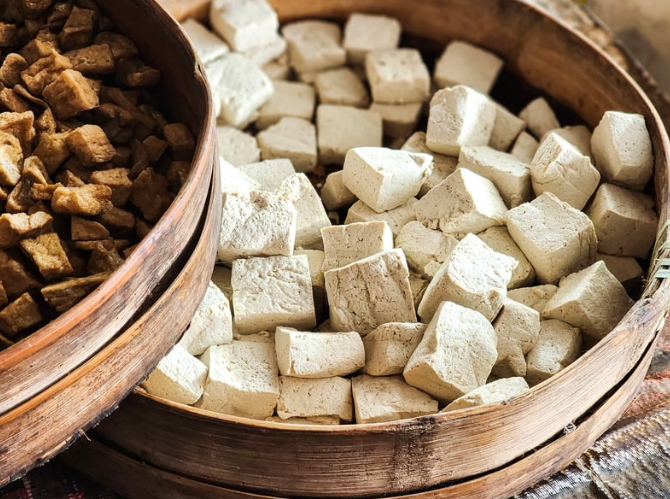What to Eat and Drink
Tofu: Discover its Hidden Health Benefits
Research suggests that consuming tofu may have various health benefits, such as reducing the risk of certain chronic diseases, including heart disease and certain types of cancer.
Tofu, the versatile soy-based product that has become a staple in many diets, has gained popularity for its health benefits. This article aims to explore just how healthy tofu really is. With its mild taste and ability to absorb flavors, tofu has become a go-to ingredient for those looking to incorporate more plant-based proteins into their meals.
Packed with essential nutrients like protein, iron, calcium, and omega-3 fatty acids, tofu is a nutritious addition to any diet. Not only is tofu low in calories and fat, but it also contains no cholesterol, making it a heart-healthy choice. The high protein content in tofu can aid in muscle growth and repair, making it a popular option for athletes and those following a vegetarian or vegan lifestyle.
So, whether you’re a long-time tofu lover or considering adding it to your diet, this article will provide you with all the information you need to make an informed choice about how healthy tofu is and how it can contribute to your overall well-being.

Nutritional Benefits of Tofu
Tofu is a versatile and nutritious ingredient. It is a great source of plant-based protein, making it appropriate for vegetarians and vegans. A 100-gram portion of tofu includes about 8 grams of protein, which is comparable to animal-based proteins. Protein is necessary for tissue growth and repair, as well as overall health.
Tofu also contains iron, calcium, and omega-3 fatty acids, all of which are necessary for a variety of body activities. Iron aids in oxygen transmission throughout the body, calcium is essential for bone health, and omega-3 fatty acids have been linked to a variety of health advantages, including reduced inflammation and improved heart health.
Tofu is also low in calories and fat, making it a good choice for weight watchers. A 100-gram serving of tofu contains approximately 70-100 calories, depending on hardness. Tofu’s low calorie and fat levels make it a filling and delicious food that won’t add too many calories or bad fats to your diet. Whether you want to maintain a healthy weight or lose weight, including tofu in your meals might be a wise decision.
Tofu is also high in vitamins and minerals. It contains vitamins B1, B2, and B6, which are required for energy production and overall well-being. Tofu also contains minerals like magnesium, phosphorus, and potassium, which are essential for optimal muscle and nerve function, as well as blood pressure regulation.
Overall, tofu’s nutritional properties make it an important part of any well-balanced diet. Whether you want to increase your protein consumption, add more plant-based items into your diet, or simply enjoy a flavorful and nutritious ingredient, tofu has you covered.

Health Effects of Tofu Consumption
Tofu eating has been linked to a variety of health benefits due to its unique nutritional profile, including improved heart health. According to research, having tofu in your diet may help lessen the risk of some chronic diseases while also improving your general health. Let’s look at some of the health benefits of tofu usage.
Tofu and Heart Health
Heart disease is the biggest cause of mortality worldwide, and following a heart-healthy diet is critical for preventing it. Tofu’s low saturated fat and cholesterol content make it an excellent addition to a heart-healthy diet. Saturated fat and cholesterol have been shown to boost blood cholesterol levels, which can increase the risk of heart disease.
Tofu can help you reduce your diet of high-saturated fat animal proteins while also improving your heart health. Tofu also contains isoflavones, which are plant substances that have been demonstrated to have beneficial benefits on heart health. Isoflavones may help lower LDL cholesterol, enhance blood vessel function, and lower blood pressure, all of which are crucial for maintaining a healthy cardiovascular system.
Tofu and Weight Management
Maintaining a healthy weight is critical for general well-being and lowering your risk of chronic diseases. Because of its high protein content and low calorie and fat content, tofu can be an effective weight-management tool. Protein is believed to be more satiating than fats or carbohydrates, which means it keeps you feeling full and content for longer periods of time, lowering your chances of binge eating.
Furthermore, tofu’s low calorie and fat content make it an excellent choice for people trying to reduce their calorie intake without sacrificing nutrients or flavor. Tofu can help you achieve your weight control goals by providing a delicious and nutritious lunch.

Tofu and Hormone Balance
The presence of isoflavones in tofu has sparked interest in hormone balancing, particularly among women. Isoflavones are plant chemicals with a structure comparable to estrogen, a hormone that regulates many body activities.
Some studies suggest that eating tofu and other soy-based products may improve hormone levels in women, potentially lowering the risk of hormone-related illnesses like breast cancer and menopausal symptoms. However, further research is needed to properly understand the link between tofu eating and hormone balance.
Tofu and Bone Health
Maintaining strong and healthy bones is necessary at any age, and calcium is an essential vitamin for bone health. A 100-gram serving of tofu contains around 350 milligrams of calcium, making it an excellent source of this crucial mineral. Calcium is essential for the development and maintenance of strong bones and teeth, as well as proper muscle function and blood clotting.
Tofu can help you acquire enough calcium, especially if you live a vegetarian or vegan lifestyle with few calcium sources. However, it is crucial to note that other factors, such as vitamin D levels and overall food balance, can influence calcium absorption, thus eating a well-balanced diet is essential for good bone health.
Tofu as a Source of Protein for Vegetarians and Vegans
Vegetarians and vegans may struggle to obtain plant-based protein sources. Tofu, with its high protein content, is an excellent way to meet your protein requirements. As previously stated, each 100-gram serving of tofu includes around 8 grams of protein, making it equivalent to animal-based protein sources.
Protein is required for a variety of body processes, including tissue growth and repair, enzyme and hormone production, and immune system support. Even on a plant-based diet, including tofu into your meals allows you to ensure appropriate consumption of this key nutrient while also meeting your protein requirements.

How to Incorporate Tofu into Your Diet
Now that you know the nutritional benefits and health effects of tofu, you may be wondering how to incorporate it into your diet. Luckily, tofu is an incredibly versatile ingredient that can be used in a wide range of dishes and cuisines. Here are some ideas for incorporating tofu into your meals:
- Stir-fry: Tofu can be chopped or sliced and mixed into stir-fried vegetables for a quick and nutritious supper. To add flavor, pair it with your favorite sauce or seasoning.
- Tofu scramble: Crumbled tofu can be used as a vegan substitute to scrambled eggs. Add your favorite vegetables, spices, and herbs to make a delightful and filling breakfast or brunch dish.
- Grilled or baked: Marinate tofu in your favorite sauce or seasoning before grilling or baking it for a tasty and protein-rich main dish. Tofu has a unique tendency to absorb flavors, making it an ideal canvas for your preferred marinades.
- Tofu desserts: Believe it or not, tofu can be used to make tasty sweets. Silken tofu can be blended with sugars, fruits, and flavorings to make creamy and healthful sweets like puddings or mousse.
- Tofu in soups and stews: Add cubed tofu to your favorite soups and stews for extra protein and texture. Tofu absorbs the flavors of the broth, making it an excellent ingredient to any soup-based cuisine.
Remember to experiment and have fun with tofu in your cooking. With its versatility and nutritional benefits, tofu can be a fantastic ingredient to incorporate into a variety of dishes, from salads to sandwiches and everything in between.
Conclusion
To summarize, tofu is an unquestionably healthy option for people seeking to supplement their diet with plant-based proteins and necessary elements. Its high protein content, low calorie and fat content, and great nutritional profile make it an excellent supplement to any healthy diet.
Furthermore, research suggests that eating tofu may offer a variety of health benefits, including lowering the risk of heart disease, assisting with weight control, and supporting hormone balance.
Whether you’re a long-time tofu fan or considering adding it to your diet, tofu’s health benefits and variety make it an excellent choice. Tofu is a pleasant and nutritious ingredient that can help you feel better overall. So go ahead, try tofu and see how it can improve your cooking experience while also supporting your health goals.
Trusted Health, Wellness, and Medical advice for your well-being



